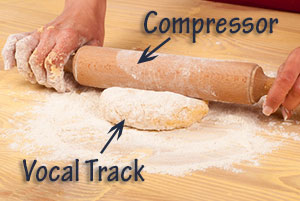What Is Audio Compression and Why Should I Care?

“Compression” is one of those many audio terms that you hear a lot but maybe don’t truly understand. You wouldn’t be alone. There are lots of ways to get confused.
First of all, “audio compression” is different from “data compression,” which refers to making a large file smaller (like turning wav audio file into an mp3) to optimize it for use on the internet. We’re NOT talking about that. Audio compression is something very specific.
Okay, so what the heck IS audio compression?
The most basic way to explain it is this: Compression “turns down” only the loudest parts of an audio file so that the overall volume is more even. If you then turn up the overall volume, the quite parts are more audible and the loudest parts are not as loud. Things are much more even and consistent.
So in a way it is sort of like a trash-compactor for sound. Why use compression? Have you ever been in a car, and a song started, and you could barely hear it? So you turn the volume up only to have your eardrums shredded when the loud parts of the song come in. You may have found yourself turning the volume up and down several times during a song to compensate for the extremes in quietness and loudness.
What you were doing while turning it up and down was manually compressing the audio! You were compressing the audio by turning the loudest parts down and the quietest parts up.
So a “compressor” automates that
Wouldn’t it be easier if you could just push a button on your car stereo and have that happen automatically? Well you probably can! The factory radio/CD player in my last car had a button that simply has a “C” on it. I had no idea what it meant until I looked it up in the manual. Guess what the “C” stands for? Yup, “compression.” Check your manuals; there might be something similar on your car’s audio controls.
Using compression for audio recording
So what about the folks recording or producing audio, or those who want to learn? How can you use compression? Well, for one thing, you can check out these other articles I’ve written: – Improve Or Ruin Your Audio With an Effect Called Compression, Vocal Compression Using Reaper’s ReaComp Effect Plugin. and Using An Audio Compressor For Voice Over Jobs.
Every audio recording program out there has built-in compressor tools. That’s how common and important it is in audio production.
The first thing you’ll probably want to do when recording music is apply compression to individual tracks, such as the vocal track or guitar track, etc.
Lead vocals pretty much always need some compression. Pop music tends to put a lot of compression on a lead vocal. That’s because it’s the most important thing in the song and in order to keep it loud enough to be heard through the music as it gets louder, but not overpower the music during the softer bits, a compressor is used to automatically even out the levels of the vocal track.
One warning here though…if you overdo the compression on a vocal track, it tends to make the singer sound like they are lisping, and some other odd things.
Compression for the entire mix
Another useful way to use compression is to boost the average volume of an entire song (or whatever kind of audio you’re listening to). This is because the loudest an audio file can be without distorting (you know that nasty buzzing sound you hear when you turn the TV on too loud for your speakers?), the very loudest part of that audio file must not exceed a certain volume level (0dB if you care :-P).
Many audio programs simply won’t allow you to turn audio up if the loudest bit of it will exceed that “distortion” ceiling. So if the audio is not loud enough, but you can’t increase the volume because there are just one or two places where it got really loud, and those are “bumping” up against that ceiling, you could just reduce the volume of ONLY those two places, leaving the rest of the audio alone.
At that point, the loudest parts are much lower, and you can turn the whole thing up much louder before any of it bumps up against that ceiling again.
That last technique is often used when editing an entire song in order to make it seem much louder. Louder can often be interpreted as “better” by some people. But be careful here too. The more you compress a final mix, the less dynamic range the song has, which basically means it won’t get softer and louder as much. That can suck the life right out some audio.
So now you know what compression is. Cool, huh? If you want to experiment with recording and producing audio, there are lots of tutorials out there on the web. Of course I think you’ll like the ones you can check out free here. But I may be biased. Either way, go forth and make the world safe for better audio, or both!
